Over the last few years the rogue-like genre has become a little bit…shall we say cluttered? Saturated? Crowded? Every other month there seems to be a new rogue-like popping out of somewhere taking inspiration from the original Rogue and more recent games like The Binding of Isaac. Things were starting to get incredibly stale, yet in 2020 the genre was rocked by the iterative-yet-compelling Hades, which blended an excellent, gameplay-consistent plot with satisfying combat. Now the bar has been raised, can the Focus-published steal the metaphorical god-inspired crown from last year’s hit?
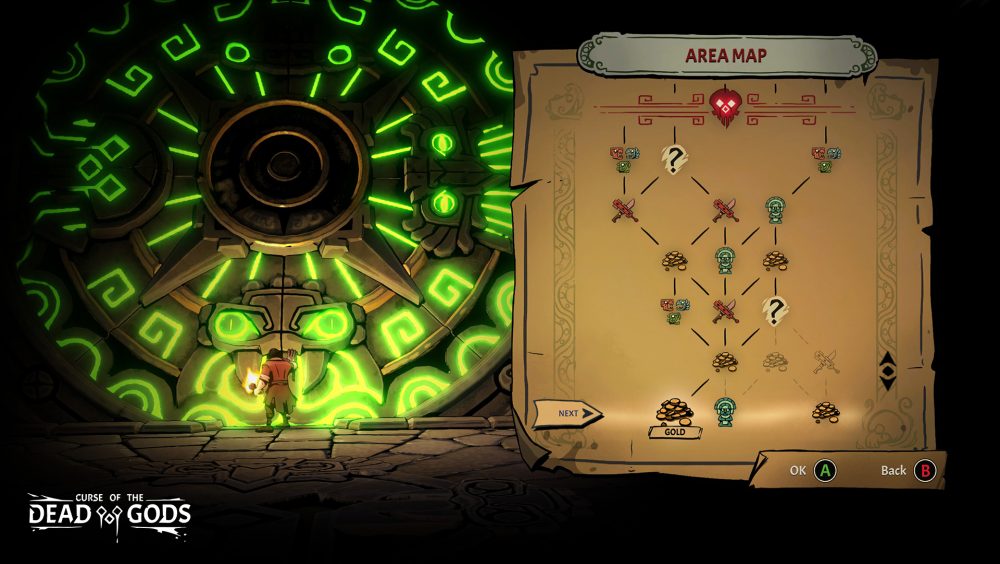
For the uninitiated, rogue-likes are characterized by procedurally generated levels, permadeath, emergent gameplay and crushing difficulty. Often, they rely on the player conducting a series of “runs,” slowly unlocking more elements for future attempts and learning what elements may come up. In addition, most rogue-likes give the player randomised power-ups throughout each run to aid progression, but which usually disappear when the player gets a game-over or completes the run. Rarely, some rogue-likes allow a player to buy progression with collected items in the form of permanent upgrades to the player, but this element varies wildly between games. Curse of the Dead Gods is no exception to the rule and contains all of the above, iterating on its precursors. However, unlike many other rogue-likes Curse contains a variety of interesting twists of these themes.
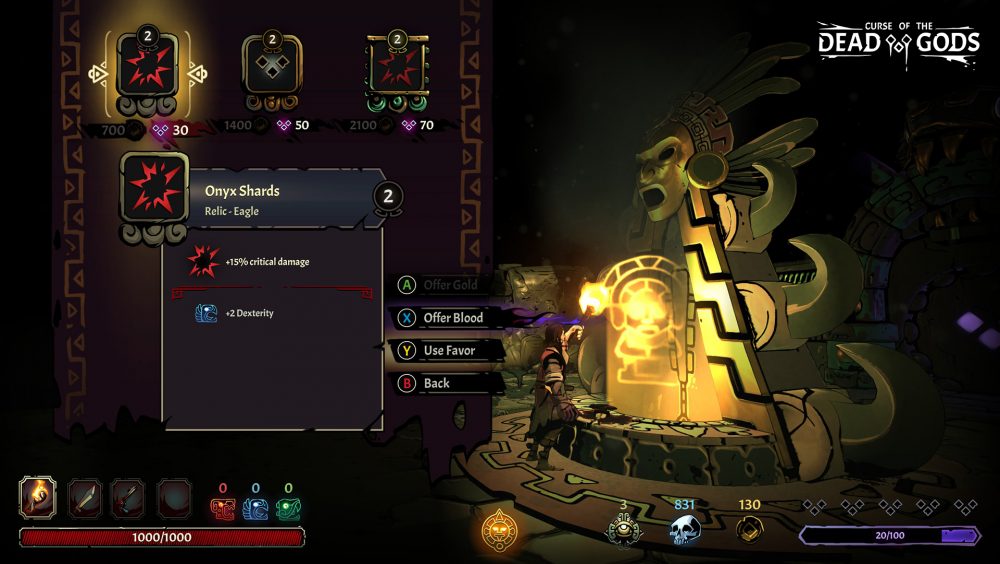
The game begins strongly with the main character, explorer Caradog McCallister, delving into an ancient temple in search of eternal life, riches etc. Soon, however, Caradog is cursed by the god Xbeltz’aloc and trapped inside. As Caradog, the player must survive three cursed temples and find the treasure he seeks, and so you are thrown into a short tutorial and your first run. The first twist to the standard formula is that from the outset you can attempt any of the 3-tier three temples, with each containing unique traps, enemies and elements.
Regardless of where you start though, your first challenge is to beat one floor of a temple – and here’s another twist – your run will end when you achieve this. After your first win, you can then go into the same temple and attempt levels one and two. Succeeded? Back to the hub to start another run, this time with the ability to go through levels one, two and three and fight the final boss of that temple. Once that’s done, do the same with the other two temples before facing an epic final run. Easy right? It’s a unique way to structure a rogue-like, but something just felt off about this for me. I resented having to keep going back to square one even if I was on a roll and would have liked to have seen how far my earlier runs could have gone if allowed to continue. Granted, this has been done before in games such as The Binding of Isaac, but in Curse of the Dead Gods the end of each run never felt particularly satisfying or rewarding.
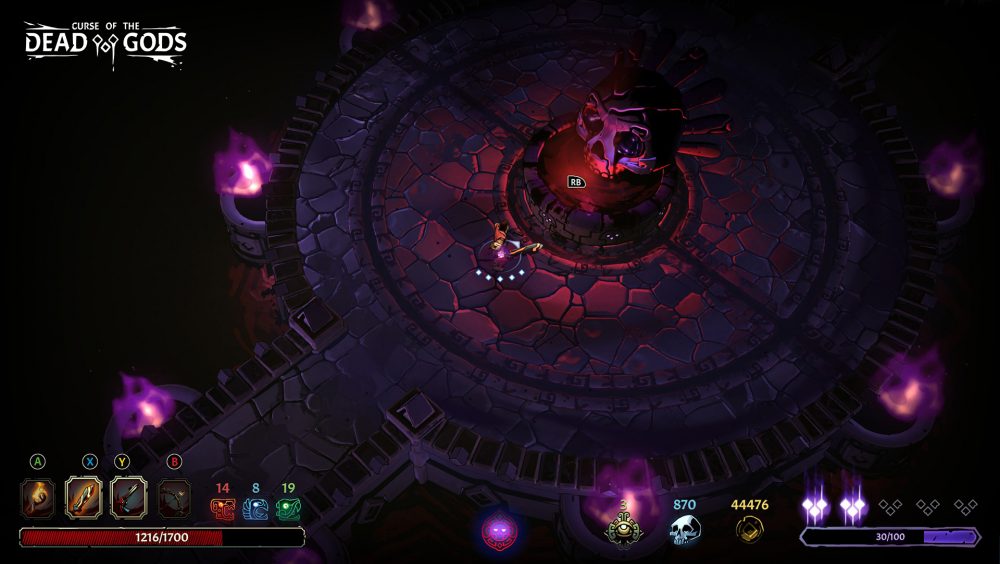
Each floor is split up into several randomised rooms, but in another twist, you have knowledge of most rooms before you enter them. Between rooms, you are shown a map of the floor’s branching paths and given the choice of which way to go. This is a compelling mechanic that goes beyond the “this or that” choices of Hades, giving players the chance to plan their route through the temple and react to their evolving build. It’s a great idea that adds strategy to the experience, and it’s executed excellently – do you go for a blessing or more gold? Do you need a new weapon or healing? – it’s up to you.
You’ll need to choose wisely, however, as you’ll always pay for your choices one way or another. Most of the time you’ll be paying for your upgrades in gold, but if your wallet is a little empty you also usually have the choice to pay in blood instead and receive corruption as a penalty.
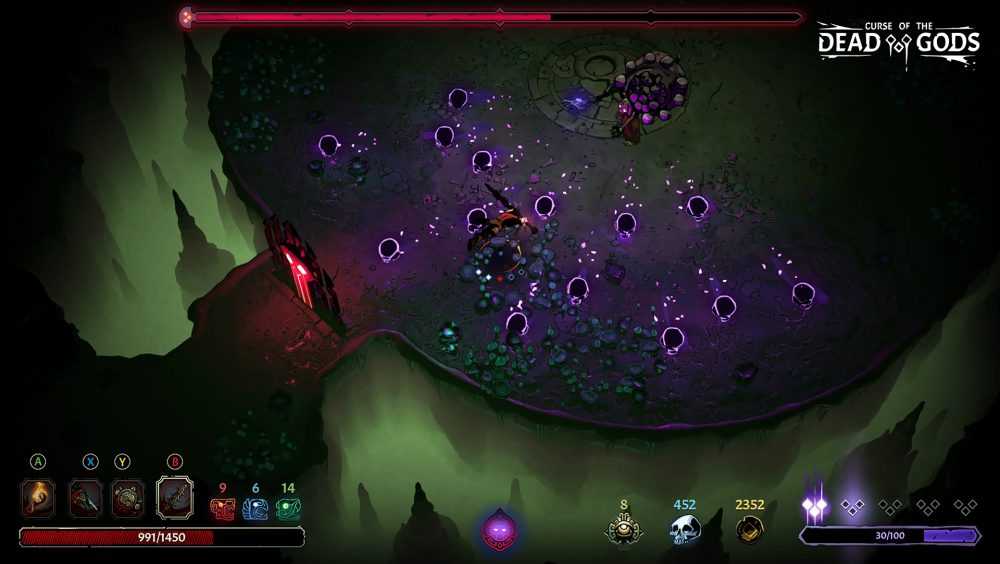
Throughout each run Caradog becomes slowly corrupted by the temple, leading to him being affected by devastating curses. The gauge, found in the bottom-right of the screen, keeps track of corruption and is filled in a number of ways;
- Being hit by certain enemies. (amount of corruption varies)
- Passing into new rooms. (20 corruption)
- Taking part in blood sacrifices. (amount of corruption varies)
When you hit 100 corruption, you go back to zero but gain a random curse with its own positive and negative effect. I’m really torn on corruption as a concept, honestly. On one hand, it’s a unique and interesting mechanic which forces you to play strategically, as practically everything from healing to buffs cost gold and it’s an infinite supply. You know how much corruption you’re likely to accrue by default and how far away from a boss you are (as beating a boss cures a single curse,) so if you play well and cleverly you can balance these pretty well. Besides, some curses are worse than others and can even be beneficial to your build. On the other hand, however, I feel the amount of corruption accrued can be too much, especially at first, and I found certain curses to be far too harsh. This may just be me being bad at the game, but this could have been mitigated by adding more ways to reduce corruption. Some will love this, others will hate it, but it’s certainly unique.
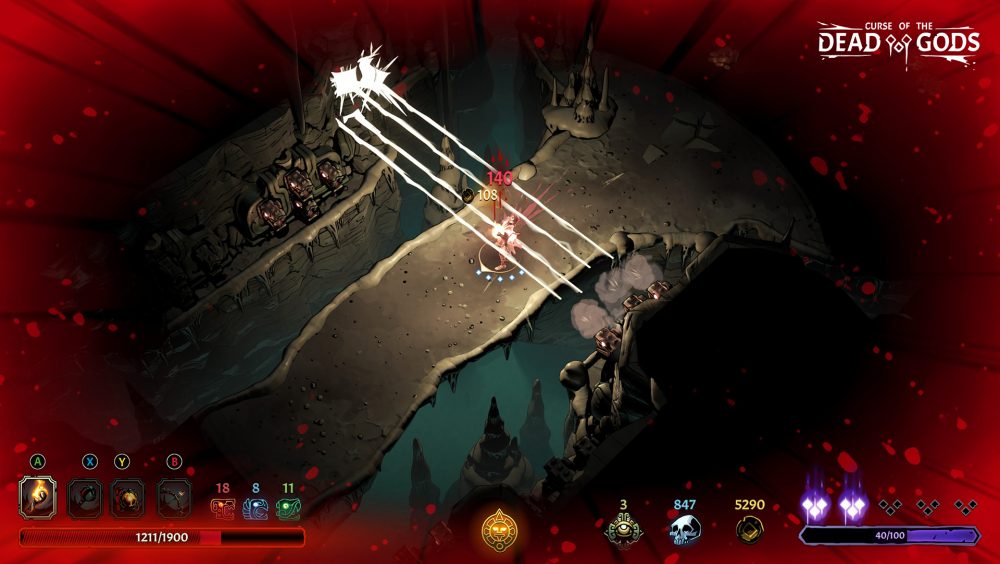
Most of your time with the game will be in combat, so luckily the combat systems in play are excellent. It would take far too long to go into every element of it here, but I’ve heard it described as a mix between Dark Souls and Hades combat. Your stamina is shown as a series of dots and these are used to parry and dodge. In a twist, however, Curse rewards skilled play by refunding stamina for “perfect” dodges and parries. These are incredibly challenging to pull off, but it’s satisfying to avoid an attack by the skin of your teeth and be given the resources back to continue your spree. Most of the time you have access to a main and sub-weapon, but you can also switch to a two-handed weapon if you like. There’s a decent number of weapons with some interesting effects and I enjoyed finding new ones as I progressed but also tended to stick to my trusty torch much of the time to mitigate the damage I took and ward off weaker enemies.
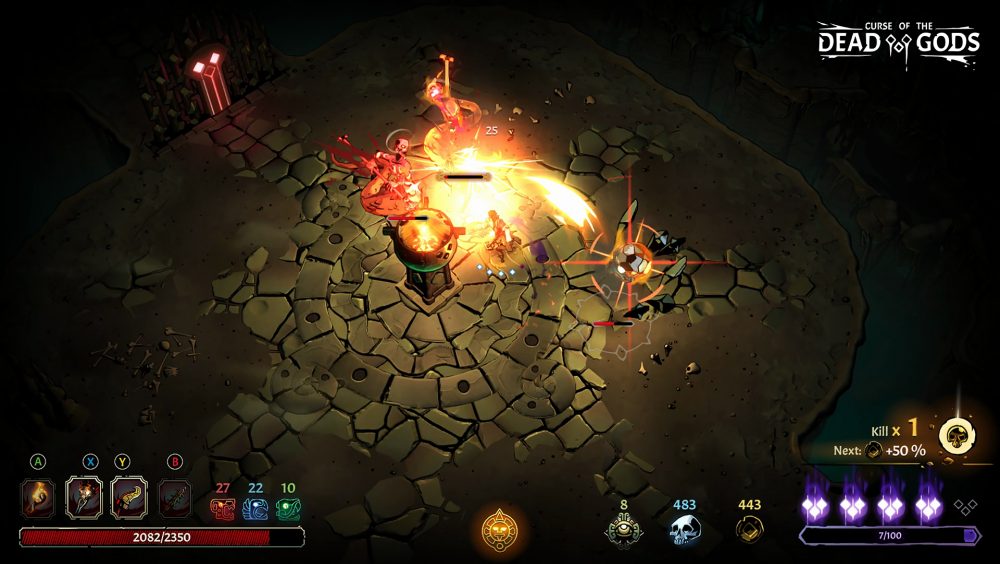
Weapons, Relics and Blessings are your upgrades and buffs in Curse, and they are awarded quite regularly. Whilst the variety of different effects pales in comparison to certain other rogue-likes, there was enough to go on that I didn’t see repeats for quite a few runs. Effects vary from increasing your stats and weapon damage to removing corruption when you get a greed kill, but as I say, there was nothing extreme that really stood out.
As you progress you will accumulate crystal skulls and jade rings alongside gold. These can be used back in the hub between runs to buy persistent upgrades, which vary from permanent stat upgrades to making new starting gear available and adding new items to the loot tables. Whilst you can only have a certain number of boons active at the start of each run, I enjoyed this element as it gave a sense of progression even after a loss, which is surprisingly uncommon within the genre.
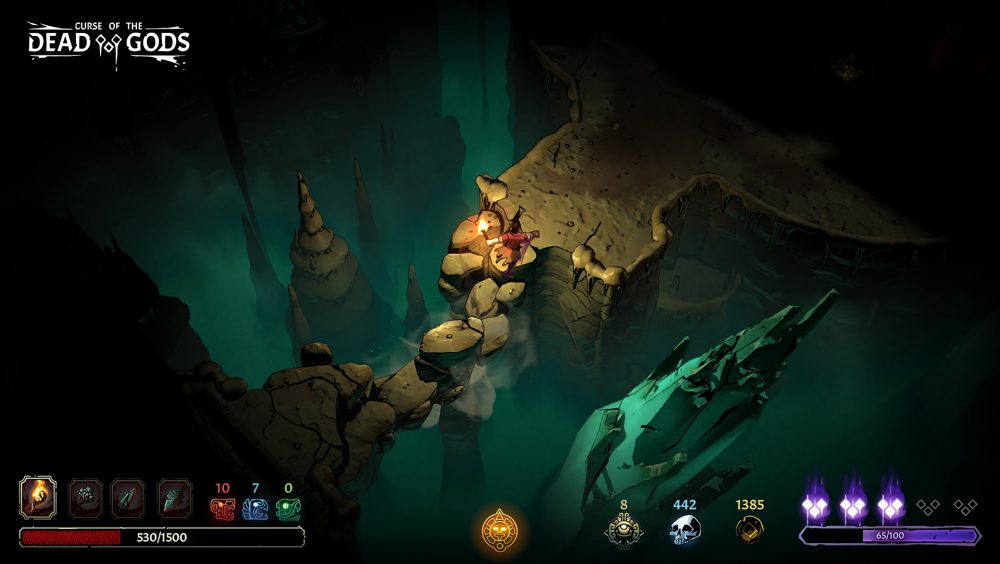
The aesthetic and style of the game is what originally drew me to it, and it certainly didn’t disappoint in that regard. The overall Aztec/Mayan style gives the whole experience a unique feel which isn’t seen in enough games and it leans further towards dark mythology than any recent Tomb Raider game. The art is beautifully bleak with an isometric, cell-shaded dirtiness and I simply couldn’t get enough of the overall world and character design. It’s very Darkest Dungeon, but I feel that whilst many will be drawn to it for that reason they’ll stay for the combat.
Overall then, how do I feel about Curse of the Dead Gods? Torn, honestly. I can tell that this is a phenomenal game with a wealth of quality content and what looks like a lively future. The combat system is challenging yet rewarding, requiring deliberate actions rather than spamming slashes, and the corruption mechanic adds a deeply strategic element to the whole thing. Despite this, I struggled to really get into it due to the difficulty level and lack of more flamboyant upgrades and weapons. Objectively though, it’s clear that Curse of the Dead Gods is a great rogue-like and if you like souls-like combat I think it’s likely you’ll love this, even if I strongly suspect it may fall short of taking Hades’ crown in the long-run.
This review is based on the Switch version of the game and can be purchased here for £17.99
- Developer: Passtech Games
- Publisher: Focus Home Interactive
- Platforms: PlayStation 4, Xbox One, Nintendo Switch, PC
Enjoy the review? want to read more of our reviews? then click right here to be whisked away to the realm of our opinions.








You must be logged in to post a comment.